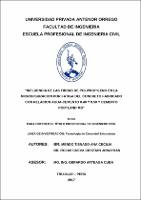Mostrar el registro sencillo del ítem
Influencia de las fibras de polipropileno en la microfisuración por fatiga del concreto fabricado con relación agua-cemento 0.40 y 0.50 y cemento Portland MS
| dc.contributor.advisor | Arteaga Cuba, Gerardo | |
| dc.contributor.author | Mendo Tisnado, Ana Cecilia | |
| dc.contributor.author | Rojas Cueva, Cristian Jonathan | |
| dc.creator | Mendo Tisnado, Ana Cecilia | |
| dc.date.accessioned | 2018-02-05T15:52:08Z | |
| dc.date.available | 2018-02-05T15:52:08Z | |
| dc.date.issued | 2017 | |
| dc.identifier.uri | https://hdl.handle.net/20.500.12759/3565 | |
| dc.description.abstract | El presente proyecto de investigación, titulado: “INFLUENCIA DE LAS FIBRAS DE POLIPROPILENO EN LA MICROFISURACIÓN POR FATIGA DEL CONCRETO FABRICADO CON RELACIÓN AGUA-CEMENTO 0.40 Y 0.50 Y CEMENTO PORTLAND MS”, se realizó en base a ensayos de laboratorio, utilizando una maquina universal de carga artesanal no reglamentada, un deformímetro con precisión 0.0001’’, una gata hidráulica de 2 Toneladas y la elaboración de cuatro vigas rectangulares de concreto simple, las cuales fueros sometidas a la aplicación de cargas repetitivas generando fatiga en el material. El ensayo de laboratorio antes mencionado se desarrolló sometiendo a las vigas rectangulares de concreto simple a un proceso de fatiga, el cual fue controlado con la finalidad de que los esfuerzos de tensión generadas por la carga aplicada, proveniente de una gata hidráulica, no superen la resistencia máxima de tracción por flexión y así evitar rebasar el rango elástico. En esta investigación se explica la manera en la que afecta la aplicación de una carga repetida a un elemento de concreto y la influencia que tienen las fibras de polipropileno para controlar la microfisuración del material. Se destaca que la aplicación de 1000gr/m3 de fibras de polipropileno en la preparación de concreto con relación agua-cemento 0.40 aumenta el número de ciclos aumento en un 32% con respecto a un concreto sin fibras de polipropileno y hace que la resistencia del concreto a la fatiga se incremente, y para un concreto con relación agua-cemento 0.50 a los 28 días de curado, el número de ciclos hasta llegar a la fisuración aumentó en un 29.40% con respecto al mismo concreto sin fibras de polipropileno. | es_PE |
| dc.description.abstract | The present research project entitled: “INFLUENCE OF POLYPROPYLENE FIBERS IN THE FATIGUE MICRO FISURATION OF CONCRETE MANUFACTURED WITH WATER-CEMENT RELATIONSHIP 0.40 AND 0.50 AND PORTLAND MS CEMENT““, was carried out based on laboratory tests, using one unregulated artisanal loading machine, a deformimeter with precision 0.0001““, a 2 ton hydraulic jack and the development of four rectangular simple concrete beams, which were subjected to the application of repetitive loads generating fatigue in the material. The above mentioned laboratory test was developed by subjecting the rectangular simple concrete beams to a fatigue process, which was controlled in order that the tensile stresses generated by the applied load from a hydraulic jack do not exceed the maximum flexural tensile strength, and avoid exceeding the elastic range. This research explains how affects the application of a repeated load to a concrete element, and, the influence that the polypropylene fibers have to control the microcracking of the material. It is emphasized that the application of 1000 gr/m3 of polypropylene fibers in the preparation of concrete with water-cement ratio 0.40 increases the number of cycles by 32% compared to a concrete without polypropylene fibres and makes the concrete fatigue strength increase; and for a concrete with water-cement ratio 0.50 at 28 days of curing, the number of cycles until cracking increased by 29.40% compared to the same concrete without polypropylene fibres. | en_US |
| dc.description.uri | Tesis | es_PE |
| dc.format | application/pdf | |
| dc.language.iso | spa | es_PE |
| dc.publisher | Universidad Privada Antenor Orrego | es_PE |
| dc.relation.ispartofseries | T_ING.CIVIL_1421 | |
| dc.rights | info:eu-repo/semantics/openAccess | es_PE |
| dc.rights.uri | https://creativecommons.org/licenses/by/4.0/ | |
| dc.source | Universidad Privada Antenor Orrego | es_PE |
| dc.source | Repositorio Institucional - UPAO | es_PE |
| dc.subject | Fibras de polipropileno | es_PE |
| dc.subject | Microfisuración | es_PE |
| dc.title | Influencia de las fibras de polipropileno en la microfisuración por fatiga del concreto fabricado con relación agua-cemento 0.40 y 0.50 y cemento Portland MS | es_PE |
| dc.type | info:eu-repo/semantics/bachelorThesis | es_PE |
| thesis.degree.level | Título Profesional | es_PE |
| thesis.degree.grantor | Universidad Privada Antenor Orrego. Facultad de Ingeniería | es_PE |
| thesis.degree.name | Ingeniero Civil | es_PE |
| thesis.degree.discipline | Ingeniería Civil | es_PE |
| dc.publisher.country | PE |
Ficheros en el ítem
Este ítem aparece en la(s) siguiente(s) colección(es)
-
Ingeniería Civil [1119]


